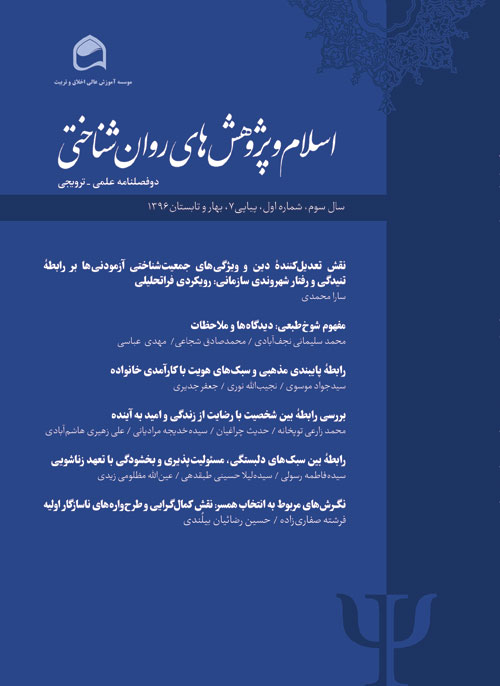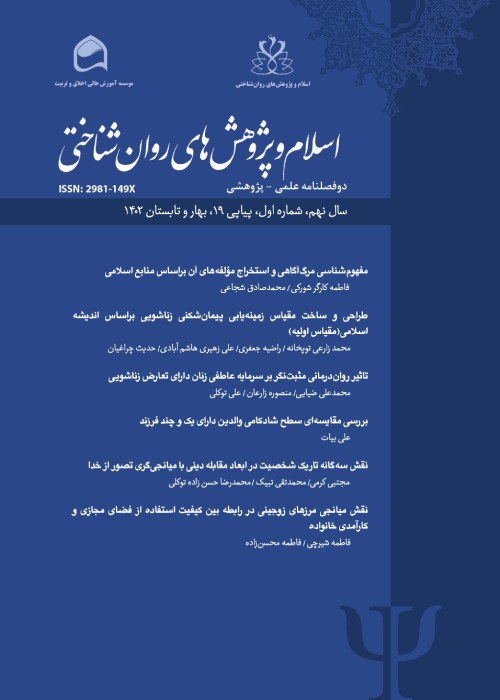فهرست مطالب

نشریه اسلام و پژوهش های روان شناختی
سال سوم شماره 1 (پیاپی 7، بهار و تابستان 1396)
- تاریخ انتشار: 1397/06/20
- تعداد عناوین: 7
-
-
صفحات 29-46
-
صفحات 119-124
-
Pages 7-28In today's highly competitive world, organizations are constantly looking for new ways to maximize the performance and endeavors of their employees. Since our society is an Islamic society based on Islam, it seems necessary to study the impact of religion on different dimensions of life and compare it with other religions. The main goal of this study is meta-analytical investigation of the relationship between strain and organizational citizenship behavior and the moderating role of religion and individual characteristics in this regard. The meta-analytical approach of this research identifies religion as an effective factor in the relationship between strain and organizational citizenship behaviors. The statistical population of this study is all studies published in reputable domestic and international journals that examine the relation between strain and citizenship behavior. Overall, more than 750 effects were identified and analyzed in 153 researches and the moderating effect of the religions of Islam, Christianity, Judaism and other religions was examined and tested. The results show that there is a significant negative relationship between strain and citizenship behavior and the type of religion of the subjects has a significant moderating effect on this relationship. Thus, in the religions of Islam and Christianity, the negative impact of the stress on the citizenship behavior was weaker, while in the Judaism and other religions, this effect was more powerful. Similarly, among other moderator factors related to the characteristics of the subjects, gender and experience have also affected the relationship between strain and citizenship behavior.Keywords: strain, religion, organizational citizenship behavior, metaanalysis, moderating variable
-
Pages 29-46The present study aims at investigating views on the concept of wittiness. The research method was descriptive-analytical and was done using the available sources to investigate five major theories on the nature of wittiness as follows: superiority, non-homogeneity, alleviation, reverse theory and positive psychological theory were investigated. The superiority theory considers the origin of wittiness to be sudden pride out of comparing oneself with others and admiring oneself due to lacking that deficiency. The theory of non-homogeneity introduces the perceptible feature of wittiness to be pleasure from non-homogenous experience and thought. The alleviation theory added physiological explanations to the non-homogeneity theory and could not resolve the drawbacks of non-homogeneity theory. The reverse theory explains the experience of wittiness on the basis of a broader theory whose drawbacks were investigated. In positive psychology, there is a definition of wittiness which, despite resolving the drawbacks of other theories, has not considered the role of the culture of different societies in explaining wittiness. Muslim thinkers, despite having a normative look at wittiness, have not comprehensively defined and discussed it. Finally, although the Islamic model of happiness has attempted to define the status of wittiness in Islamic teachings, it does not seem to present a vivid result on determining it demarcations and explaining its differences and common points with other concepts.Keywords: nature of wittiness, seekingsuperiority, non-homogeneity, positivepsychology, reverse theory.
-
Pages 47-66The present study aims at investigating the relationship of religious commitment and identity styles with family efficiency. It was of descriptive type and was conducted through a correlational method. The statistical population was composed of all male and female seminary students and university students in Islamic Azad University in Qom. For the research sample, 388 subjects were selected. The participants presented some of the demographic specifications, and answered the following questions: JRAQ, ISI-6G, and SFEQI. The findings show that family efficiency is positively correlated with religious commitment and informational identity styles and is negatively correlated with religious non-commitment and dualism. The results of regression analysis showed that religious commitment and dualism as well as informational identity style is able to predict family efficiency.Keywords: religious commitment, identity styles, family efficiency
-
Pages 67-82The present research aims at investigating the relationship between life satisfaction and hope for future among high school students. It is of descriptive and correlation type. The research sample was composed of 316 male and female high school students in Robat Karim, selected through cluster random sampling. The research tools consisted of Eysenck’s 90-question questionnaire on personality, a 5-question questionnaire on life satisfaction, and Snyder’s 12-question hope scale. The data were analyzed using Pearson correlation coefficient and Multivariate regression. The research findings showed that Psychoticism and Neuroticism are correlated with decrease in life satisfaction and Extraversion is correlated with increase in life satisfaction. Besides, Psychoticism and Neuroticism are correlated with decrease in hope for future and Extraversion is correlated with increase in hope for future. Another finding is that Psychoticism and Neuroticism and Extraversion can explain 18/5 percent of variance of life satisfaction and 17 percent of variance of hope for the future. So, nurturing efficient personality characteristics plays an important role in life satisfaction and hope for future among high school students.Keywords: personality, lifesatisfaction, hope for future
-
Pages 83-102The present study aims at investigating the relationship between attachment styles, responsibility and forgiveness and marital commitment. It was done through a descriptive method. The statistical population of the study was composed of married personnel in university of medical sciences in Sari city. 256 of them were selected through random selection. To gather data, we used four questionnaires as follows: Adams and Jones Marital Commitment Questionnaire, Hazan and Shaver Attachment Scale Questionnaire, Harrison Gough’s Responsibility Scale, and Ehteshamzade et al Interpersonal Forgiveness Scale. To analyze data, we used descriptive statistics and Pearson’s correlation coefficient as well as multi-variable regression simultaneously. The findings showed that there is a meaningful relationship between attachment styles, responsibility and forgiveness and marital commitment. The results of regression analysis showed that among three subscales of attachment styles, safe attachment style plays a greater role in predicting the variable of marital commitment. Besides, responsibility and forgiveness are able to predict marital commitment. In general, the findings of the study suggest the important and influential role of the variables of attachment, responsibility and forgiveness in predicting marital commitment.Keywords: marital commitment, attachment styles, responsibility, forgiveness.
-
Pages 103-118
ABSTRACT This study aims at investigating the roles of ‘perfectionism’ and ‘early maladaptive schemas’ in predicting attitudes towards mate selection among university and seminary students in Qum city, Iran. This was a descriptive and correlational study: 163 students were selected at universities (government and non-government) and seminaries of Qom city through available random sampling. They all completed three questionnaires: ‘Attitudes about Romance and Mate Selection Scale’ ( ( ARMSS), Hill’s (2004) ‘The Perfectionism Inventory’, and ‘The Young Schema Questionnaire–Short Form’ ( ( YSQ-SF). Data were analyzed using correlation coefficients and stepwise regression analyses. The findings indicated that ‘attitudes about mate selection’ had significant correlations with domains of ‘Disconnection/rejection’, ‘Impairedautonomy’ ‘Impaired performance’, ‘Otherdirectedness’, and ‘Impaired limits’, and components of ‘Striving for excellence’, ‘Need for approval’, and ‘Perceived parental pressure’. The results of stepwise multiple regression analyses showed that the domain of ‘Disconnection/rejection’ in early maladaptive schemas’ domains, and the components of ‘perceived parental pressure’, ‘Rumination’, and ‘Striving for excellence’ from perfectionism’s components are among the most important predictors of ‘attitudes towards mate selection’. These findings reveal the important roles of perfectionism and early maladaptive schemas in shaping attitudes about mate selection. Thus, for reinforcing logical believes and attitudes in mate selection in people, it appears necessary to design educational preventing programs for them, considering these variables.
Keywords: Perfectionism, earlymaladaptive schemas, attitudes towardsmate selection, marriage


